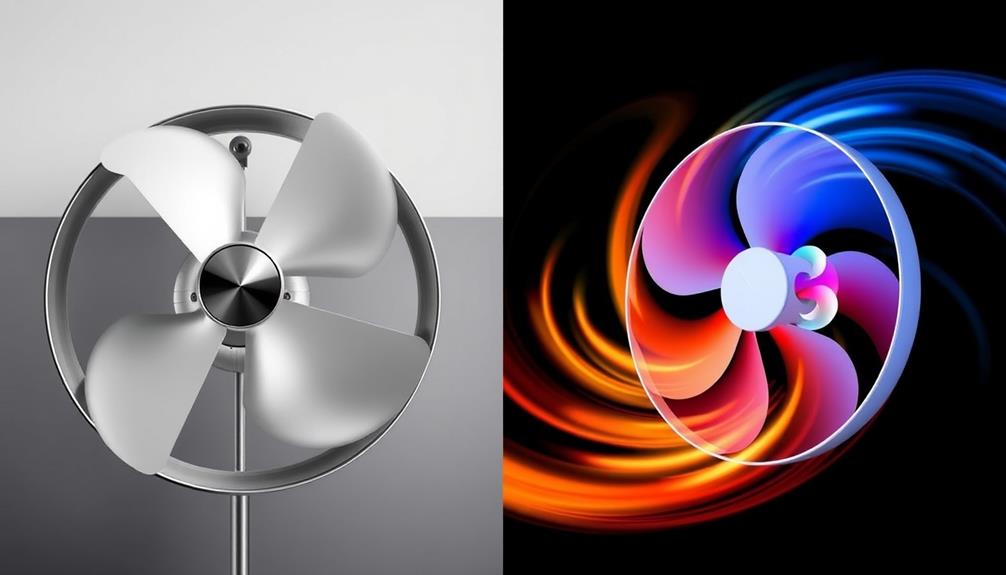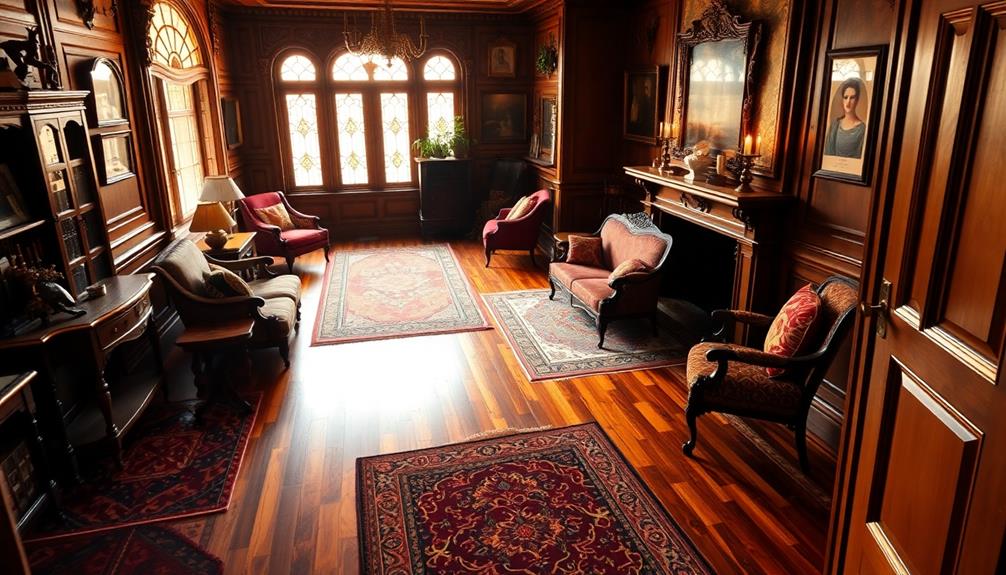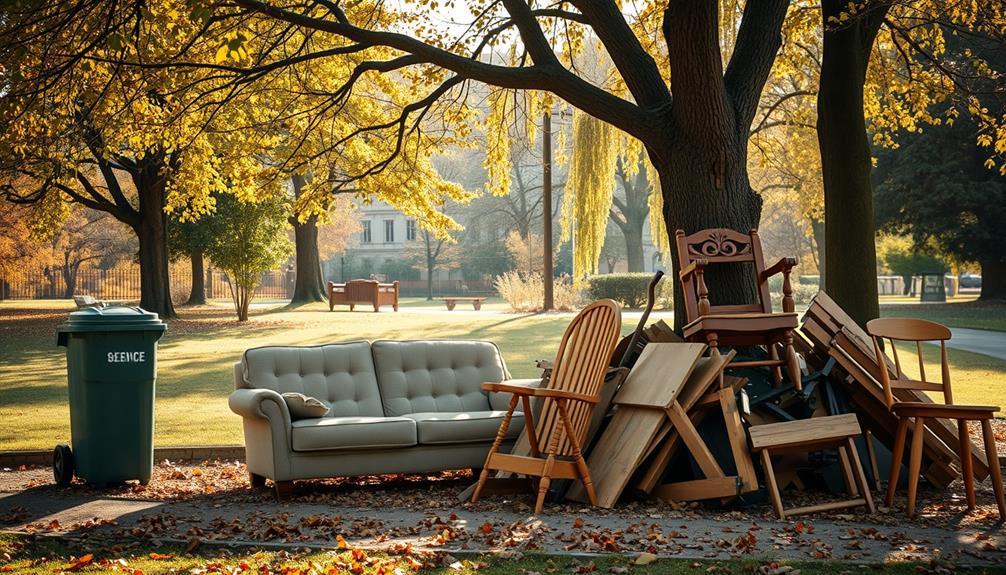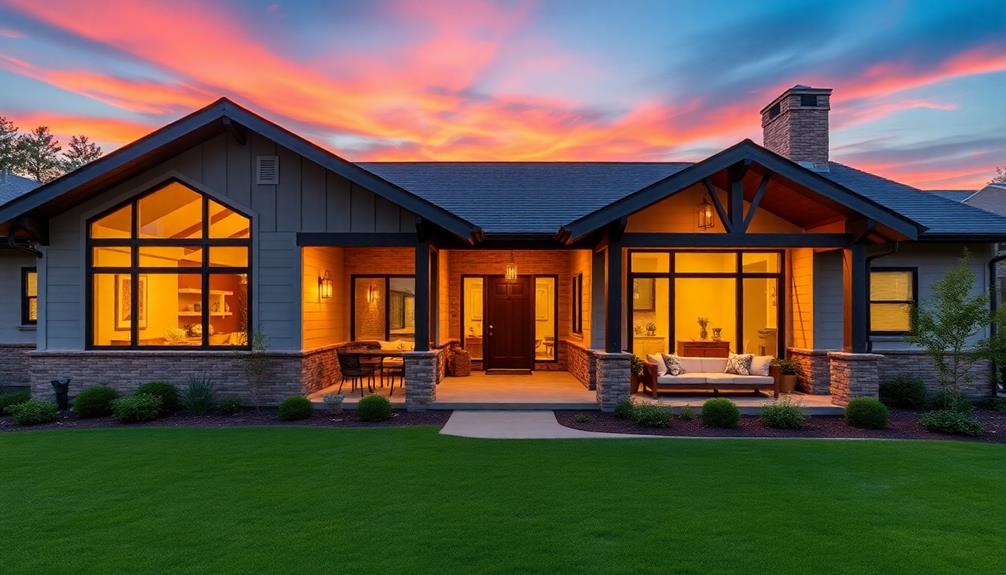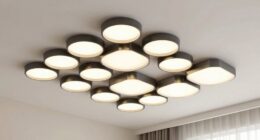When it comes to choosing between AC and DC fans, you will likely discover that DC fans are the better option. They operate more efficiently, using less power and reducing your electricity costs, which can provide significant long-term savings. Additionally, DC motors are quieter, making them perfect for environments where noise is a concern. Despite potentially costing more upfront and having a shorter lifespan, the energy savings of DC fans often make up for these drawbacks. AC fans can still be a viable choice, particularly in traditional setups. If you want to learn more about the distinctions and advantages of each type, there is plenty more information to be discovered.
Key Takeaways
- DC fans are more energy-efficient, resulting in lower electricity bills and reduced carbon emissions compared to AC fans.
- AC fans typically last longer than DC fans, averaging 10 to 15 years versus 5 to 10 years for DC fans.
- DC fans operate more quietly due to their brushless motors, making them ideal for noise-sensitive environments.
- While DC fans have a higher upfront cost, their energy savings can offset this expense over time.
- Both AC and DC fans offer various design options, allowing users to choose styles that enhance their home decor.
Power Source and Motor Efficiency
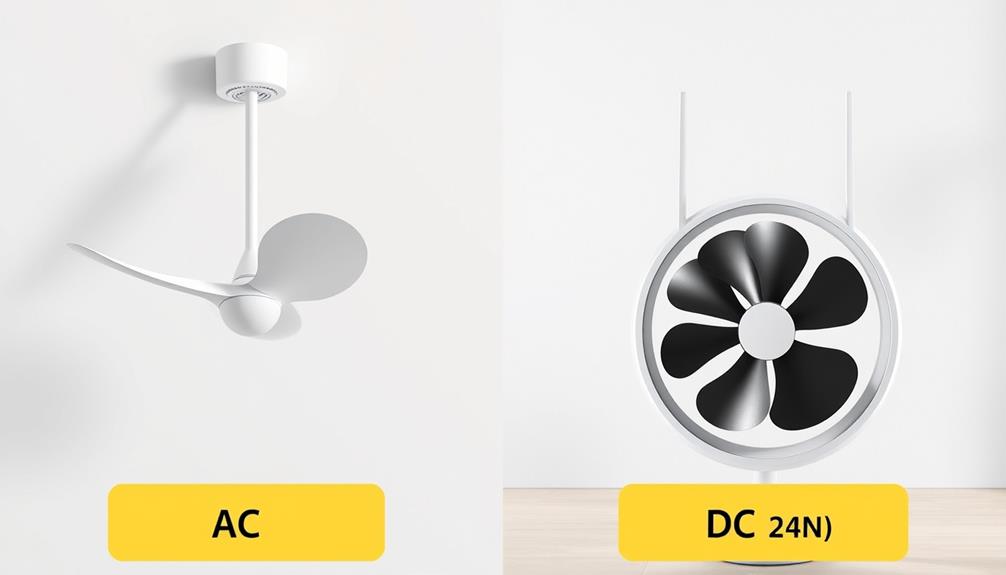
Choosing between AC and DC fans begins with understanding their power sources and motor efficiency. AC fans use standard alternating current from your home's electrical system, utilizing induction motors that rely on electromagnetic induction to generate airflow.
In contrast, DC fans operate on direct current, often sourced from batteries or solar panels, and employ brushless DC motors that enhance efficiency.
You'll find that motor efficiency greatly affects energy consumption and performance. Generally, DC motors exhibit higher efficiency than AC motors, translating to lower electricity bills over time.
Plus, the smoother operation of DC motors results in reduced noise levels. Keep in mind that AC fans typically use 120 volts, while DC fans can handle a broader voltage range, giving you more flexibility depending on your needs.
Energy Efficiency and Environmental Impact
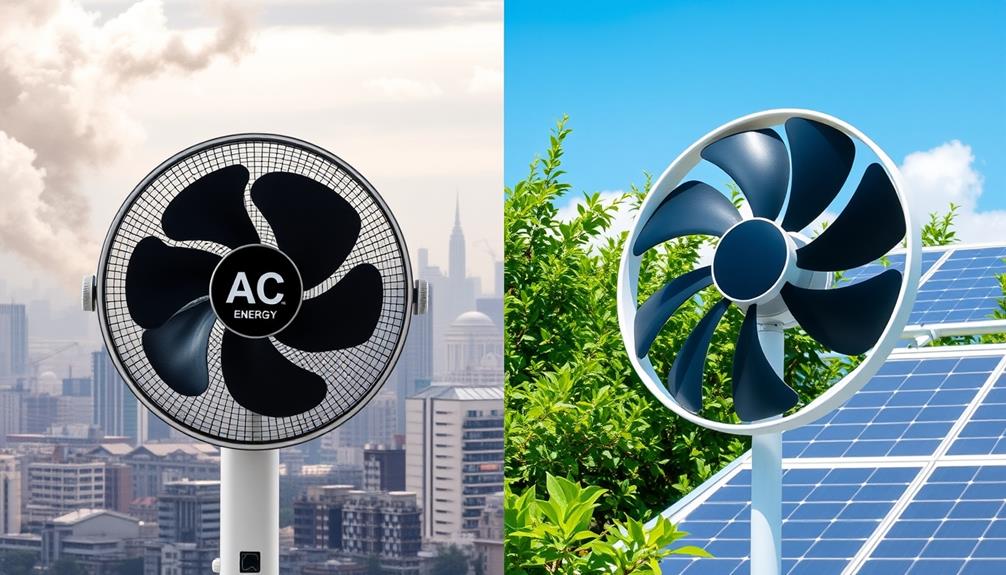
When it comes to energy efficiency and environmental impact, DC fans clearly outshine their AC counterparts.
You'll find that DC fans consume considerably less power, converting electrical energy to mechanical energy more effectively. This means lower electricity bills and reduced carbon emissions, making a positive impact on the environment.
Their higher efficiency ratings contribute to superior cooling performance while minimizing energy waste. By choosing a DC fan, you're not only saving money but also supporting sustainability.
With lower greenhouse gas emissions over time, your choice helps combat climate change.
Noise Level Comparison
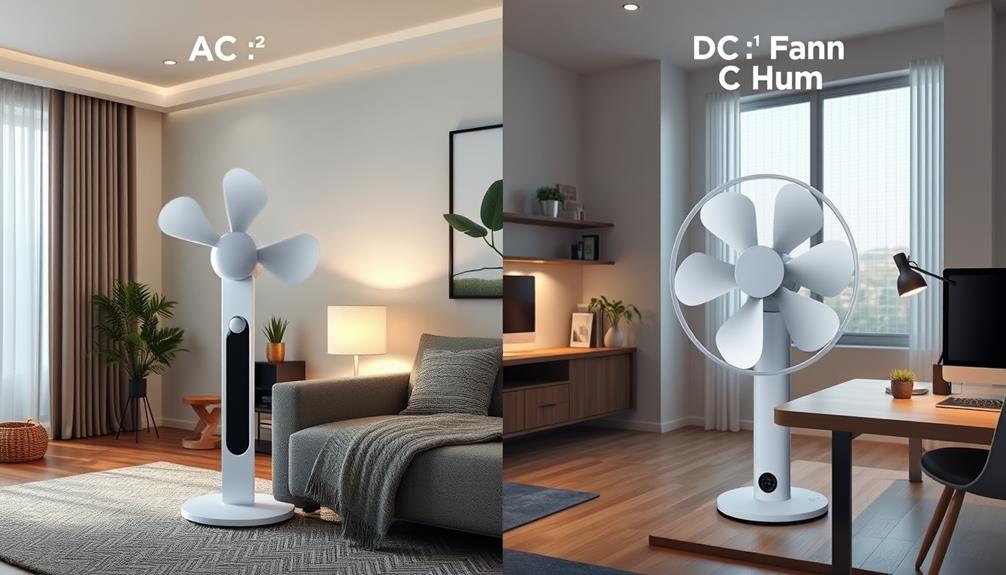
A significant difference between AC and DC fans lies in their noise levels, which can greatly affect your comfort. If you're sensitive to sound, you might prefer DC fans. DC fans tend to operate more quietly than their AC counterparts, making them a better choice for those who are easily disturbed by noise. Additionally, DC fans often provide better control over speed and airflow, allowing for a more customized and comfortable experience. However, if you do encounter issues with airflow, troubleshooting fan airflow problems can help ensure your DC fan is operating at its best.
Here are three key points to evaluate:
- Motor Design: AC fans typically use induction motors, which can create more noise during operation. In contrast, DC fans utilize brushless motors that run quietly.
- Noise Reduction Features: Many modern AC fans incorporate noise-reducing technologies, but DC fans inherently produce less sound due to their design.
- Blade and Insulation Design: DC fans often feature advanced blade designs and better motor insulation, leading to a more peaceful environment.
Ultimately, if you're seeking tranquility while staying cool, DC fans often come out on top in the noise level comparison.
Cost Analysis and Longevity
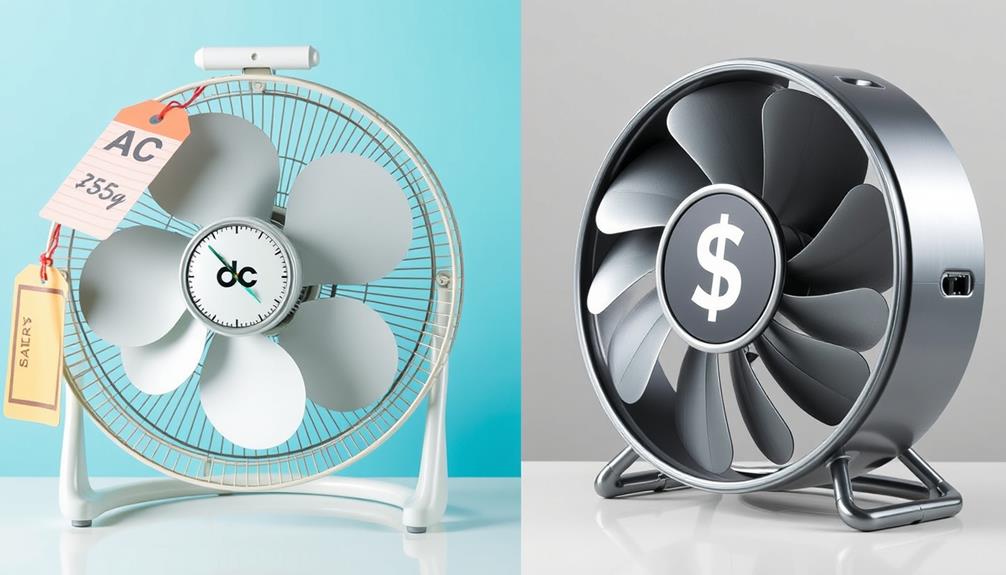
While noise levels are an important factor, the cost and longevity of AC and DC fans also play a significant role in your decision-making process.
Initially, DC fans usually come with a higher price tag compared to AC fans. However, their energy efficiency leads to lower electricity bills, which can offset that upfront cost over time.
AC fans typically last between 10 to 15 years with proper care, while DC fans have a shorter lifespan of 5 to 10 years.
Maintenance needs differ too; AC fans require regular motor lubrication and possible capacitor replacements, while DC fans are generally maintenance-free.
Ultimately, weighing these factors can help you choose the fan that best fits your budget and longevity expectations.
Design Options and Aesthetic Appeal
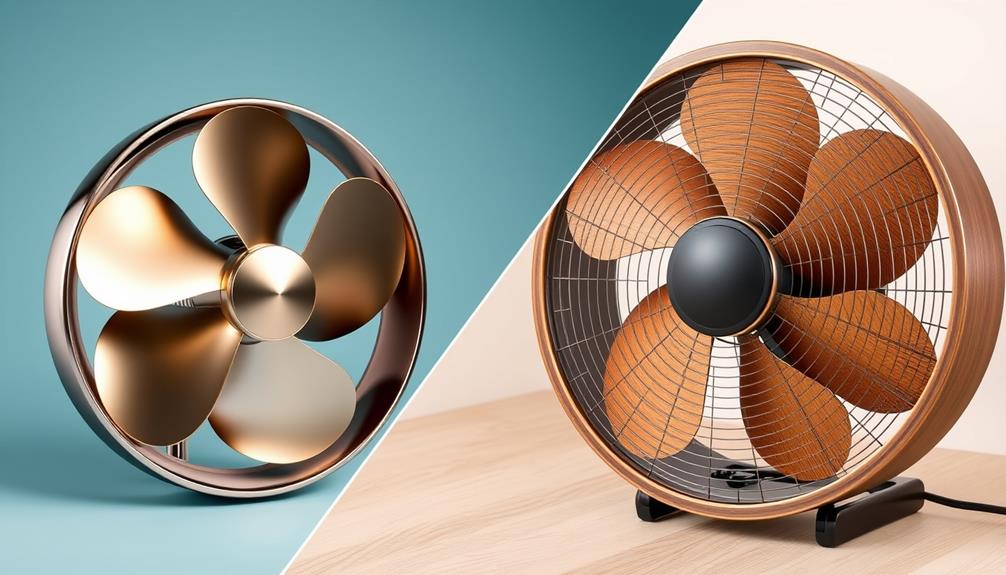
Ceiling fans offer a wide array of design options that can elevate your home's aesthetic appeal. When choosing a ceiling fan, consider these key factors:
- Style: From modern sleek designs to rustic wooden finishes, select a fan that complements your decor theme.
- Size: The fan's size should match the dimensions of your room; larger rooms benefit from bigger blades for ideal airflow.
- Color and Finish: Options like brushed nickel, bronze, or colorful finishes can enhance your interior while providing a stylish touch.
Whether you're aiming for functionality or flair, selecting the right fan design can transform your space.
A well-chosen ceiling fan not only cools but also becomes a focal point in your room, harmonizing with your aesthetic vision.
Speed Control Features
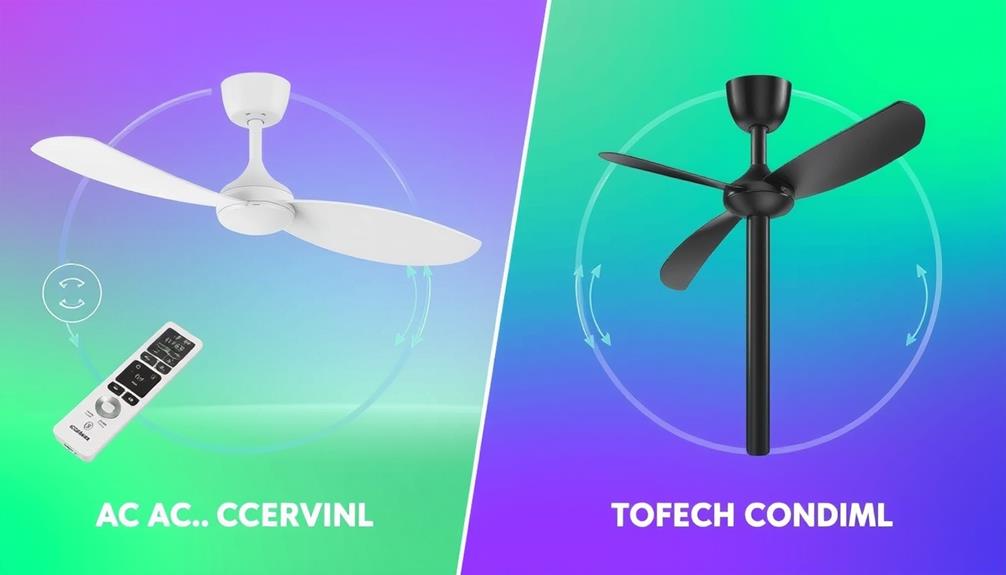
Numerous speed control features enhance the versatility and functionality of ceiling fans, allowing you to customize airflow to suit your needs. You can choose from various control methods, such as remote controls, wall switches, and pull chains. Many fans also offer preset speed settings and timer functions for automatic shutdown. Additionally, reverse mode features let you switch airflow direction for seasonal comfort.
| Control Method | Features | Benefits |
|---|---|---|
| Remote Control | Convenient, adjustable | Easy access from anywhere |
| Wall Switch | Traditional, simple | User-friendly installation |
| Pull Chain | Manual control | Cost-effective and straightforward |
| Timer Function | Automatic shutdown | Energy-saving capability |
These options provide you with flexibility, ensuring your comfort year-round.
User Experience and Preferences
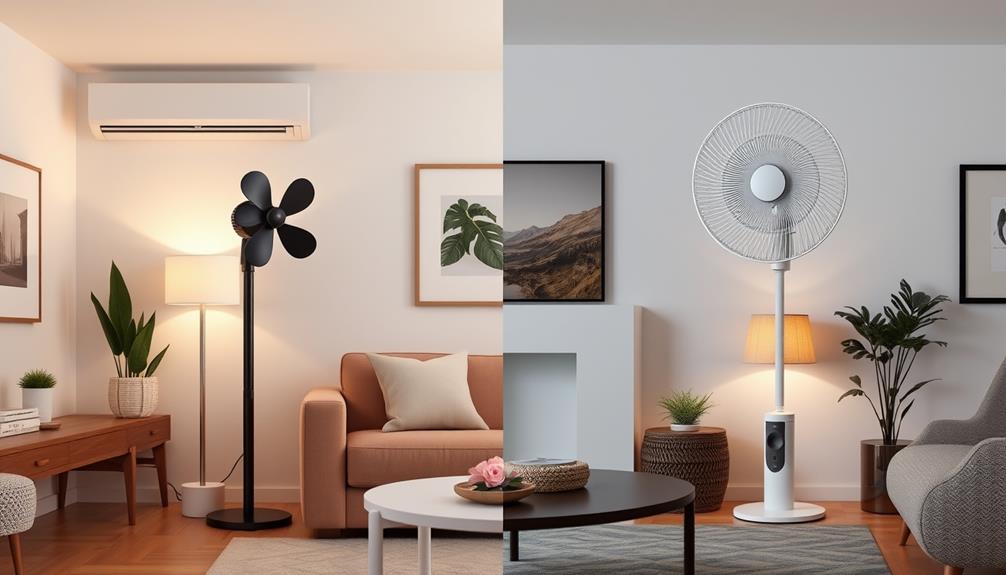
Many users appreciate the personalized experience that modern fans offer, making it easier to tailor airflow and ambiance to their preferences.
Whether you lean towards AC or DC fans, your choice can greatly impact your comfort. Here are some aspects to evaluate: When choosing between AC and DC fans, consider the noise level, energy efficiency, and control options. AC fans tend to be noisier and less energy efficient, while DC fans are generally quieter and more energy efficient. Additionally, DC fans typically offer more control options for adjusting speed and direction. When troubleshooting a faulty ceiling fan, it’s important to consider if the issue could be related to the fan’s motor type and control system. For instance, a DC fan may have a different set of troubleshooting steps compared to an AC fan.
- Noise Level: DC fans operate quietly, perfect for bedrooms or offices, while AC fans can be noisier, impacting your environment.
- Energy Efficiency: DC fans save energy, leading to lower bills, which can be a deciding factor in long-term use.
- Control Features: With options like remote controls and speed settings, you can adjust your fan to suit your needs effortlessly.
Ultimately, your personal preferences will guide you in choosing the fan that best enhances your living space.
Frequently Asked Questions
How Do AC and DC Fans Differ in Installation Requirements?
When installing fans, you'll find AC fans typically connect to standard electrical wiring, while DC fans often require a compatible power supply. Verify you check voltage requirements to avoid any installation issues for both types.
Are There Safety Concerns With Using AC or DC Fans?
Did you know that nearly 30% of home fires start due to electrical issues? When using fans, guarantee proper installation, avoid overloading circuits, and regularly check for frayed wires to minimize safety concerns.
Can DC Fans Operate in Extreme Temperatures?
Yes, DC fans can operate in extreme temperatures, but you should check the manufacturer's specifications for ideal performance ranges. Proper installation and maintenance will enhance their efficiency and longevity in challenging environments.
What Are the Best Brands for AC and DC Fans?
When searching for the best brands, think of a treasure map guiding you. Popular choices include Hunter and Casablanca for AC fans, while Dyson and Vornado shine brightly among DC options, offering style and efficiency you'll love.
How Do Fan Warranties Compare Between AC and DC Models?
When comparing fan warranties, you'll often find that DC models typically offer longer warranty periods due to their advanced technology. AC fans generally come with standard warranties, emphasizing the need for thorough research before purchasing.
Conclusion
In the battle of AC vs. DC fans, the choice ultimately boils down to your needs and preferences. If you're after energy efficiency and quiet operation, DC fans might just sweep you off your feet. However, if you value reliability and lower upfront costs, AC fans could be your trusty companion. So, weigh your options like a chef selecting ingredients, and pick the fan that'll whip up the perfect breeze for your home.
